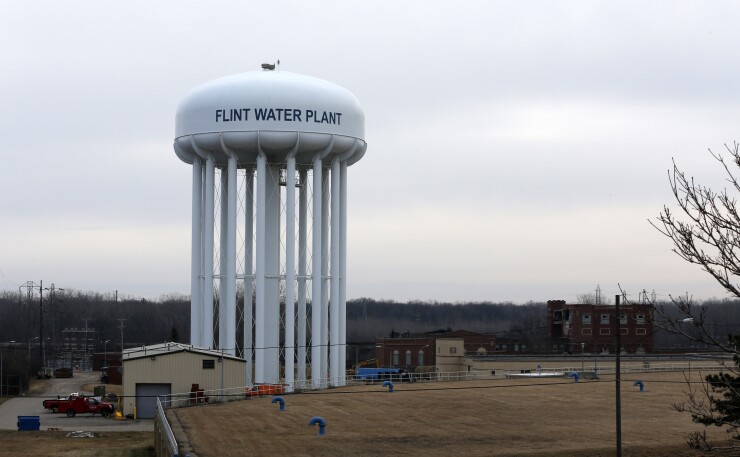Michigan’s recently enacted budget for fiscal 2020 will deliver extra money for replacing lead pipes to comply with tougher lead and copper rules that were adopted by former Gov. Rick Snyder's administration in the wake of the Flint water crisis.
The state aid is a credit positive, particularly for cash-strapped municipalities servicing low income communities that already charge above-average rates and face high lead remediation costs, according to a Moody’s Investors Service report.

“Raising rates can be a challenge for utilities serving low-income communities because the prices are relatively less affordable for residents,” Moody’s stated in the report. “Absent additional state assistance, many utilities will need to issue sizable amounts of debt and significantly raise rates to replace lead pipes.”
The $105 million in one-time state support includes $37.5 million to help utilities comply with a state mandate to remove all lead pipes, $35 million in loan forgiveness for general clean water projects, and $25 million partly to remove the dangerous chemical known as PFAS.
Kurt Weiss, a spokesman for the state budget office, said the $37.5 million dedicated for lead pipe removal will be distributed as grants, to help systems with start-up costs.
“The boilerplate says the grants are not to exceed $2 million,” Weiss said. “The department will need to develop the grant process and I am assuming that work has yet to be started.”
Highland Park is an example of a low-income community facing a high lead pipe remediation price tag that is already charging rate payers above-average rates, according to Moody’s.
The city has pegged the costs of replacing lead pipes at $22 million and plans to issue debt and raise residential water rates by 65% over the next five years to help pay for the loans and capital costs.
The city is applying for a $100 million in state Drinking Water Revolving Fund loans to cover the cost of pipe replacement along with other needed infrastructure repairs. “If all $100 million were financed today with borrowing, the burden would equal a very large 19x fiscal 2018 revenue,” Moody’s said. “While a combination of rate increases, state grants and loan forgiveness will moderate the debt burden, it will still be high for the sector.”
Michigan last June adopted the nation’s strictest rule for lead in drinking water, including requiring utilities to replace all of the state’s roughly 500,000 lead service pipes within 20 years in response to Flint’s water contamination crisis.
The water contamination crisis followed the city's decision to participate in the Karegnondi Water Authority project. After Flint's contract with Detroit supplied water ended, the city's state-appointed emergency manager shifted to Flint River water as the city awaited completion of the new KWA pipeline. Flint did not treat the water properly, leading to the contamination crisis.
“Flint plans to have all of its lead pipes removed by the end of the year, largely because of external support,” Moody’s said. “The Environmental Protection Agency and the State of Michigan have provided more than $450 million in assistance in the wake of the water crisis.”





